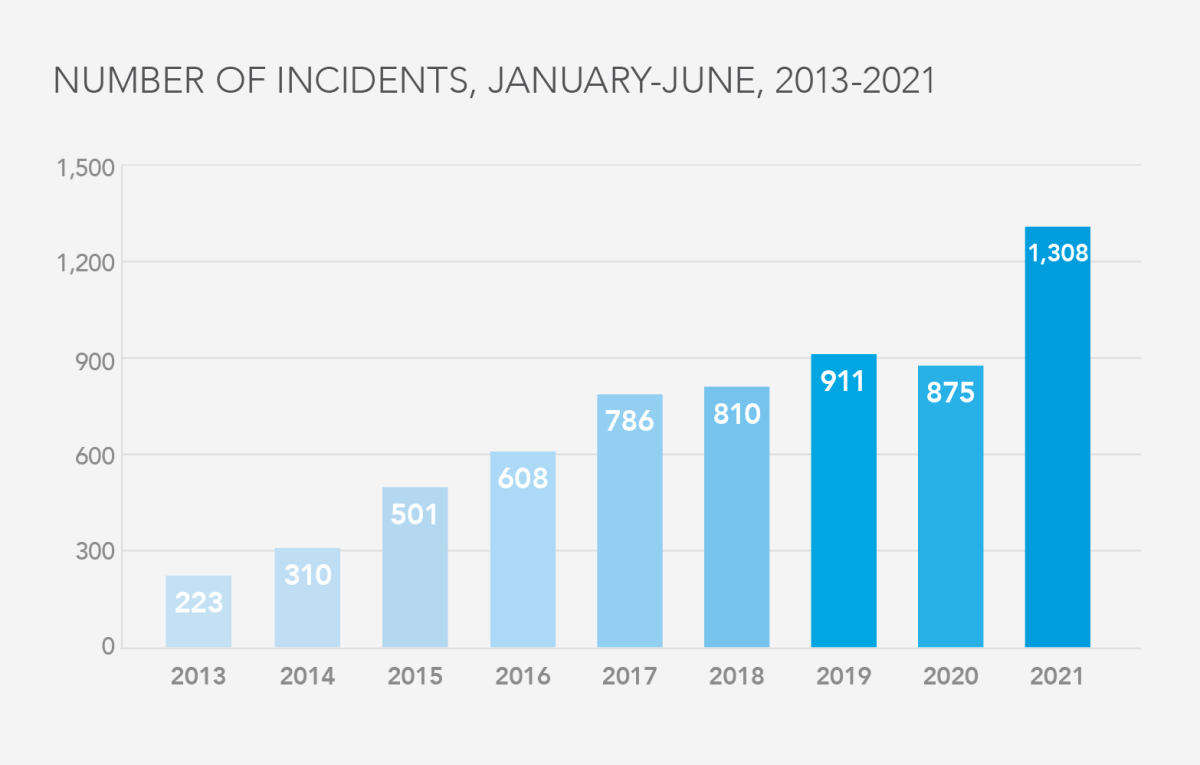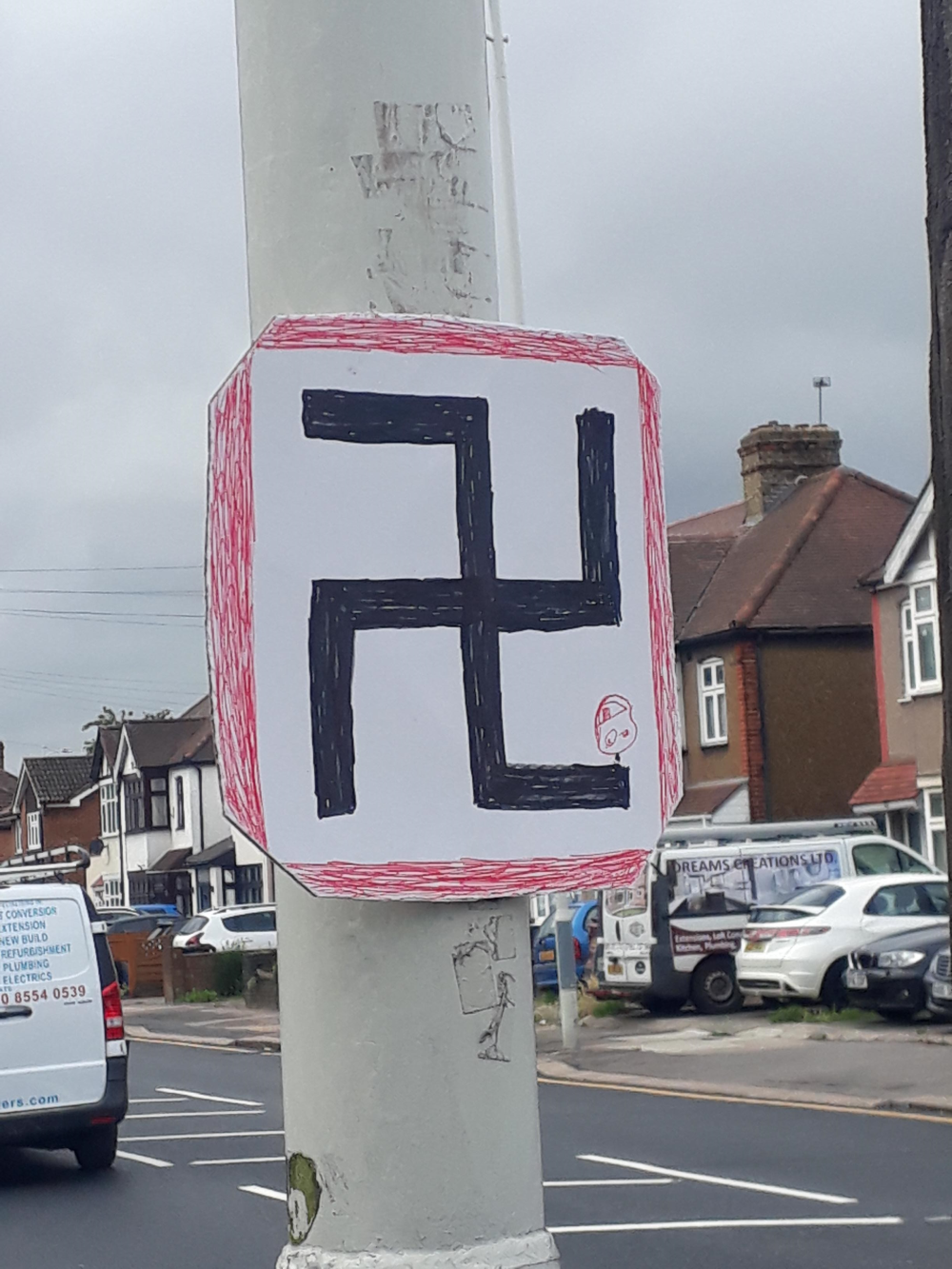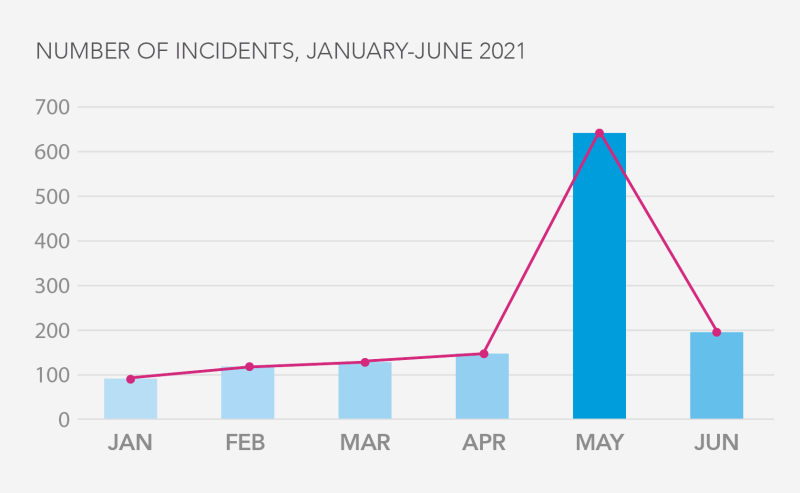CST’s Antisemitic Incidents Report January-June 2021, published today, shows that CST recorded 1,308 anti-Jewish hate incidents nationwide in the first half of this year. This is a 49% increase from the 875 incidents recorded in the first six months of 2020, and is the highest total CST has ever recorded in the first half of any year. CST recorded 911 antisemitic incidents in the first half of 2019, 810 in the first half of 2018 and 786 in the first six months of 2017. The total of 1,308 antisemitic incidents from January to June 2021 is higher than every full-year incident total prior to 2016. CST has recorded antisemitic incidents since 1984.
A further 396 reports of potential incidents were received by CST in the first six months of 2021 but were not deemed to be antisemitic and are not included in this total of 1,308 incidents. Many of these 396 potential incidents involved suspicious activity or possible hostile reconnaissance at Jewish locations; criminal activity affecting Jewish people and buildings; and anti-Israel activity that did not include antisemitic language, motivation or targeting.

The record total of 1,308 antisemitic incidents in the first six months of 2021 is due to the spike in anti-Jewish hate reported during and following the escalation in violence in Israel and Gaza. In May 2021, the month when the conflict in the Middle East intensified, CST recorded a monthly record of 639 antisemitic incidents. This accounts for 49% the 1,308 antisemitic incidents recorded in the first half of 2021, and would, on its own, constitute a record half-year tally in every year prior to 2017. It exceeds the second and third highest monthly totals combined, which were reported in July and August 2014 during the previous comparable escalation in Israel-related hostilities, when there were 317 and 229 incidents respectively.
The most common type of language or imagery used in antisemitic incidents over the first six months of 2021 referenced the conflict in the Middle East, demonstrated anti-Zionist political motivation, or both. This type of discourse was present on 693 occasions, compared with 151 in the first half of 2020 – a year without a significant trigger event from the Middle East. Forty-three incidents directly compared Israel with Nazi Germany, while the terms “Zionism” or “Zionist” were employed in 68 incidents, often as euphemisms for “Jewishness” and “Jew”. There were 277 incidents in which offenders used far right or Nazi-related discourse, of which 59 incidents evidenced far right political motivation.
The surge in incidents correlating with conflict in the Middle East also coincided with the relaxation of COVID-19 restrictions, and continued a pattern in which the peaks and troughs of recorded antisemitism corresponded with the severity of governmental restrictions on public or collective activity. In January 2021 just 89 antisemitic incidents were reported to CST, the lowest monthly total recorded since December 2017 (86 incidents) and only the second month since then in which CST recorded fewer than 100 antisemitic incidents, with December 2020 (90 incidents) the other. In contrast, May saw the relaxation of many pandemic-related restrictions. It is possible that the loosening of social regulations, coinciding with the war in Israel and Gaza – a subject that triggers strong emotional responses – provided people with a potential release from months of lockdown-induced frustration.
The pandemic has led those who wish to spread anti-Jewish hate to find new ways of doing so. In the first half of 2021, CST received 13 reports of video conferencing events being hijacked with antisemitic material. These ‘Zoombombings’ were unheard of prior to the COVID-19 outbreak, but quickly became a method by which antisemites could take advantage of the new social reality; there were ten such incidents between January and June 2020. CST recorded 41 incidents containing antisemitic rhetoric alongside reference to the pandemic, rising from the 26 such cases reported over the same period in 2020. These range from conspiracy theories about Jewish involvement in creating and spreading COVID-19 (or the ‘myth’ of COVID-19) for malevolent and financial benefit; to simply wishing and hoping that Jewish people catch the virus and die from it; to offensively misappropriating Holocaust-era imagery.



There were 130 anti-Jewish hate incidents involving schools, school students and teachers, the most reported in the first half of any year and a sharp increase of 491% from the 22 such incidents recorded in the first six months of 2020. Of these, 80 incidents involved Jewish schoolchildren or staff at non-faith schools, rising considerably from the six incidents of this type reported from January to June 2020. It is unusual for such a high proportion of school-related incidents to take place at non-faith schools and CST supported many schoolchildren and teachers who felt isolated and fearful about returning to their place of education and work. Schools were not the only educational facilities where a spike in antisemitism occurred in relation to events in Israel and Gaza. From January to June 2021, there were 84 antisemitic incidents in which the victims or offenders were students or academics, or involved student unions or other student bodies. Of these, 57 occurred in May. This is the highest number of campus-related incidents recorded in the first half of any year, and an increase of 200% from the 28 incidents of this kind reported over the same timeframe in 2020.
CST recorded 89 violent antisemitic incidents from January to June 2021, the highest ever recorded in the first six months of a year and an increase of 68% from the 53 violent incidents in the first half of 2020. Eighty-seven of these violent incidents were in the category of Assault while two were classified by CST as ‘Extreme Violence’, meaning they involved potential grievous bodily harm (GBH) or a threat to life. There were 56 incidents of Damage & Desecration of Jewish property in the first half of 2021; 1,073 incidents of Abusive Behaviour, including verbal abuse, antisemitic graffiti, antisemitic abuse via social media and one-off hate mail; 85 direct antisemitic threats; and five cases of mass-mailed antisemitic leaflets or emails. All these category totals, except for mass-mailed antisemitic literature, were record highs for the first six months of any year.
Online antisemitic incidents fell slightly, from 364 incidents in the first six months of 2020 to 355 in the first six months of 2021. This is the second year in a row in which online incidents have fallen during the January to June period, but is still the second-highest total that CST has recorded during the first six months of any year. These totals understate the scale of online antisemitism: CST only records antisemitic incidents if they have been reported by either the victim or a witness; if the content shows evidence of antisemitic language, motivation or targeting; and if the offender is based in the United Kingdom or has directly targeted a UK-based victim. Targeted campaigns directed at individual victims often involve dozens of accounts sending hundreds or even thousands of tweets, images or posts within a concentrated timespan, or hundreds of tweets from a single offender, but each campaign of this type will only be recorded by CST as a single incident.
CST recorded 748 antisemitic incidents in Greater London, an increase of 51% from the 496 incidents recorded in London in the first half of 2020; and 181 antisemitic incidents in Greater Manchester, an increase of 159% from the 70 incidents in the comparable time period in 2020. Elsewhere in the UK, CST recorded 30 antisemitic incidents in Leeds, 28 in Gateshead, 25 in Liverpool, 17 in Birmingham and 15 in Borehamwood & Elstree. CST recorded an antisemitic incident in all but four Police regions across the country.










